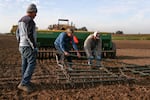Oregon farmers and ranchers are increasingly dealing with severe droughts, wildfires, sweltering heat waves and pests that can all-together decimate entire fields. With stress and uncertainty about the future because of climate change, agriculture researchers say more farmers are seeking ways to cope.
There are resources for Oregon food producers dealing with general stress, depression or anxiety, like the Agristress Helpline, but there has not been not much focus on the effect of climate change on the mental health of farmers, said Maud Powell, a farmer and professor of practice in small farms at Oregon State University.
Powell, along with a team of colleagues, launched the Climate Stress and Grief: Building Resilience in Farmers and Ranchers project to help fill that need.
“The tendency is just to want to zone out and, for farmers, they often just want to put their nose to the grindstone and work harder. There’s this kind of stoicism with farmers,” Powell said. “And there needs to be a space where people can talk about this depth of feeling and then offer advice on ways that people can be more resilient.”

FILE: Jose Vasquez, left, Gayle Goschie, center, and Eloy Luevanos work to set up a harrow to be pulled behind a grain hopper and tractor in preparation for planting winter barley at Goschie Farms in Mount Angel, Ore., Tuesday, Oct. 31, 2023. Frequent heat waves, like the one that began in July, are shining a spotlight on the increasing stress and uncertainty the Oregon farmers are facing due to climate change.
Amanda Loman / AP
Powell said farmers and ranchers are closely connected to their local ecosystems and weather patterns, so they notice yearly change.
As the climate warms, more precipitation is falling as rain rather than snow in many areas of the Pacific Northwest — including Oregon. But with warming temperatures, there’s less snow and it melts earlier, which means less water will last long enough through winter and spring to feed streams and reservoirs for agricultural irrigators.
Oregon summers are also trending hotter and extreme heat waves, like the one that began in July, are happening more frequently, increasing the possibility of smaller harvests or scorched crops.
The unpredictability that climate change increasingly brings can take a toll on a farmer’s livelihood, leading them to make painful decisions.
Through the Climate Stress and Grief initiative, OSU faculty members offer workshops and training to help food producers identify and define feelings like climate stress or grief and to find both emotional and agricultural ways to cope.
“Just literally giving people terms for the feelings that they’re experiencing and letting them know that they’re not alone in these feelings is actually really healing in and of itself and really supportive to farmers and ranchers,” Powell said.
Workshop participants can also look for ways to become more resilient to future disasters by establishing farming practices that can better withstand the effects of climate change.
Powell said climate stress or climate grief can look different for everyone. During workshops, Powell said, faculty will ask farmers to get specific about their losses, which could look like the loss of 20 acres of hazelnut trees due to a severe ice storm, or the noticeable decrease of insects like butterflies or crickets at a farm.
“It’s the same idea as if you went to a funeral and you told all the stories about your uncle. And so you’re actually honoring and expressing gratitude for the thing you lost and then you’re actually able to start accessing your feelings.”
While the effects of climate change are likely to continue, Powell said there’s at least one silver lining about the workshops.
“A positive thing about all of this is that people are really having to work together more,” Powell said. “I see that there’s opportunities for more connections, more cooperation. And that’s what we’re trying to foster by having these group conversations.”
Metal health resources
- The Oregon Agristress Helpline — (833) 897-2474, available 24 hours a day, seven days a week by call or text.
- Suicide and Crisis Lifeline — 988 or 1-800-273-8255
- 211, a free service that provides information and referrals to local social services.
- Climate Stress and Grief: Building Resilience in Farmers and Ranchers
